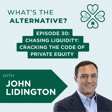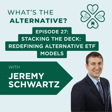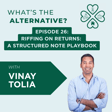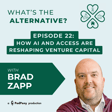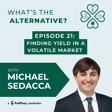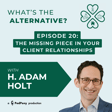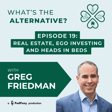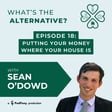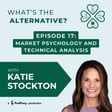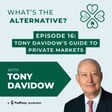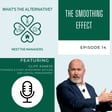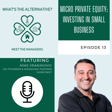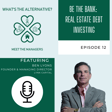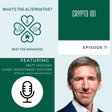Become a Creator today!Start creating today - Share your story with the world!
Start for free
00:00:00
00:00:01

What's the Alternative? | Episode 15 | The Ins and Outs of ETFs featuring Vince Lorusso
Shana sits down with Vince Lorusso, President & CEO of Clough Capital Partners L.P., who shares how he went from a family of lawyers to becoming a finance professional. He talks about his passion for finance, transitioning from hedge funds to exchange-traded funds (ETFs), and the benefits of ETF strategies like transparency and tax savings. Vince also explains the challenges of adapting to new regulations and offers tips on managing risk, short positions, and market volatility.
Connect with us below!
- Vince Lorusso on LinkedIn
- Clough Capital Partners
- Shana Orczyk Sissel on LinkedIn
- Banríon Capital Management
Transcript
Introduction to the Podcast
00:00:00
Speaker
Frankly, when you're short a stock or shorter position, you are more likely, as likely or more likely to be the next buyer of that security than somebody who has no position in security. I mean, nobody plans, I don't think, to be infinitely short of security.
Meet Vince Lourisot
00:00:12
Speaker
place go welcome to bonrun capital management's what's the alternative podcast join host shana orzisissil the Queen of Alternatives and founder, CEO of Bonner & Capital Management, as she interviews leaders in the alternative investment space, learn more about their firms, their passions, and about the many different ways investors can use alternative investments to add value in their investment portfolios.
00:00:43
Speaker
Welcome, everyone, to another episode of What's the Alternative, where we talk with our managers that are in the field, that are managing our alternative investment products to help you better understand these strategies so that you can best use them in your client portfolios. Today,
Vince's Career Pathway
00:01:01
Speaker
we have with us Vince Lourisot with Cloud Capital, and he is one of the newest partners on the Vonrean platform. ah So welcome, Vince.
00:01:12
Speaker
Hi, Shana, thanks for having me today. Excited to be here. I'm excited to have you. I wanted to start off the conversation just talking a little bit about your background and how you kind of ended up where you're at today um and how you started you know managing the portfolio that you're managing today. Yeah, happy to give you the background. you know I kind of started out with growing up in Philadelphia with of family of lawyers and and thinking that I was going to follow in their footsteps. My father's an attorney in Philadelphia today and and I kind of went to school and played as many sports as like if I could make the team I played and I got involved in a lot of different activities and I tried to you know think about where I would take my my college career and Boston always appealed to me. I wanted to be in the city of Boston and um I thought that'd be a fun place to go to school and learn but I really went there thinking you know eventually I'm going to go to law school and a lot of the feedback I got from
00:02:03
Speaker
kind of my lawyer, family, friends, where you know you don't really need to take pre-law. You could kind of broaden your your educational opportunities and get an undergraduate degree and then and then apply to law school. and And that seemed like a plan. I mean, I was pretty young to to say that I had kind of high conviction about where this would all take me. But that was my mindset going up to Boston College. um So I majored in finance. And kind of lo and behold, I just really enjoyed the subject matter. And you know it turned out that BC was a a strong school in that area and Boston as a as a town.
00:02:31
Speaker
Had a lot of opportunities for students that wanted to learn about finance and investing so you know i kinda think about my my education taking me down this path of finance and accounting and economics um and i kind of had a new found interest in that and it began with.
00:02:47
Speaker
You know more formally I guess with an internship at c3 bank and I, you know, I often think about kind of the timing of when you're learning about important subjects and what's going on in the in the industry around you and it just so happened that in the late 90s when I was an undergrad, it was a really interesting time to be in finance and investing of course we were in the.
00:03:03
Speaker
you know what in hindsight was the tech bubble but you know equities were doing extremely well job opportunities in finance were kind of you know prolific i mean it wasn't that difficult frankly as a as a finance major in nineteen ninety eight to to join an investment company and,
00:03:19
Speaker
you know At an entry level position, I joined a company that was at the time called New England Funds. So my transition from undergraduate to the finance industry you know kind of began with an internship and then like so many folks, it turned into an entry level position at a firm where I i kind of got my foundational skills, I guess, in the in the industry. I had some of my licensing, I learned about you know, different investment strategies. And and the the wonderful thing about joining a company like New England Funds, frankly, i I knew so little about it when I joined, but it didn't take very long to realize, gosh, this is part of a much larger organization. It was affiliated at the time with MetLife, and we had these um investment partners that were really scattered around the country. And and what I came to realize in my, what ultimately was six years with
00:04:06
Speaker
New England funds and then the Texas Asset Management and mutualfunds.com, kind of different affiliates of this larger entity, I came to realize and appreciate there's a lot of different ways to invest. And as long as you have a rigorous process and discipline and you're transparent and hardworking, you know you can build investment strategies that cater to kind of a range of needs. um One of those affiliates was Loomis Sales in Boston, and they had a really big reputation As a bond manager, they did an exceptional job. It was really fun for me to get to learn that process and you know and think about the way they invested. But then on the other end of the spectrum, we had international managers like Hansberger based in Florida. um Oakmark was affiliated with Netflix and still is and they're a value equity shop based in Chicago. And so the point being, I think, Shane, as I look back, at that decision to join what was ultimately a much larger firm with a lot of different kind of affiliates and partners. I think of it as like a rotation and asset management for me, you know, as somebody coming into the into the industry at a really interesting time, and obviously watching different firms navigate the tech bubble and and
Cloud Capital and Change Bridge
00:05:07
Speaker
kind of the
00:05:07
Speaker
the run-up in equities that happened earlier in my career i learned from that that one i have a really keen interest in this industry and specifically i wanted to join the by side you know i wanted to be more um on the security analysis part of the industry um So I was getting a lot of experience in service and marketing and some project management experience. um But I really realized you know kind of in those first few years, I want to be a portfolio manager. I want to build portfolios. I want to help clients achieve their objectives. I want to have a rigorous process that's repeatable and disciplined. um And that really brought me to Cloud Capital Partners in 2004. So by now, I had been in the industry a little while and you know was fortunate enough to to get an opportunity to join that firm.
00:05:48
Speaker
as they were really at the early stages of growth. So I joined a team of you know seven employees. And we had a couple hundred million dollars in assets under management. But we were you know fortunate enough to be kind of on the right side of the tech bubble and in and beginning a nice runway for growth in terms of strategies and and offerings and products and growth at the team level and asset level. And that that began really a 16-year stretch that I had at Cal Capital Partners.
00:06:13
Speaker
um I then in two thousand and nineteen i actually launched any shop with a good friend and a colleague in the industry. And that was called change bridge so i tried to take some of the learnings i had hopefully acquired a cop capital all those years and i saw a regulatory change that was actively managed the f second new opportunities there.
00:06:33
Speaker
And the thought that we had in launching Change Bridge was that if we could take again this rigorous investment process and strategy, ah be really you know thoughtful about portfolio construction and make the strategy available in the active ETF structure, we thought that would create interesting opportunities to launch a business.
00:06:52
Speaker
Lo and behold, a few years later, I rejoined Cloud Capital Partners, this time as president and CEO, and I effectively brought the ETFs with me. So I was able to stay kind of in that portfolio management capacity for the strategies we had launched on the New York Stock Exchange, and was then able to bring those back to Cloud Capital, effectively rejoin that team that I have worked you know so closely with for so many years. I'm really excited to kind of be here today with you know Hopefully an industry experience set that will help me navigate cycles ahead from an investment and research process with products that we're really excited about in the active ETF structure and with a team that I think is just kind of best in class. And we're just so excited to be to be with Cloud Capital today and and to have those active ETFs as part of our offerings to clients.
00:07:34
Speaker
ah It's really interesting
Regulatory Changes and Liquid Alternatives
00:07:35
Speaker
you mentioned Nitexis. A lot of people might not be aware. Nitexis was actually one of the early adopters of making ah liquid alternatives available to you know the general public. um you know They have been overseeing gateway um funds for a long time, which is a very long ah history of doing covered calls and other options-based strategies very successfully. In fact, fun fact, if you read Harry Markopoulos' SEC letter about Madoff,
00:08:14
Speaker
um he actually references the Gateway Fund in that letter as like the proxy for what Madoff should have looked like Um, uh, and then they also were, um, they, they have alpha simplex under their, uh, hood, uh, Andrew low and, um, alpha hedge fund replication. So they were very early in when the first regulatory changes you touched on one that made alternative strategies.
00:08:44
Speaker
available in ETF form. But prior to that, in 2007, there were regulatory changes that made them more accessible in a mutual fund form. So um a lot of people aren't aware that these products have been few and far between until these changes happened, which really um has only been in you know the last not even two decades that we've seen these changes to make these products accessible. And of course, as you also know,
00:09:10
Speaker
um They didn't necessarily line up well in terms of market environment for these products to you know show what they can really do, especially the 07 ones. um Because we went into this full bull market and anything that was hedging underperformed, at least in the eyes of ah the general investor who's just looking at them in terms of the market, which I think is a good segue into talking a little bit about your experience running like long, short hedge funds and what it's like to take that experience and then translate it into an ETF, which has some restrictions. So you can't necessarily take exactly what you were doing. Can you talk a little bit about, you know, those limitations, like how, how you ran um
00:09:57
Speaker
a traditional hedge fund that's long, short and how you had to kind of make changes and adjustments to meet the regulatory framework and the regulatory restrictions of being able to do long, short and ETF.
00:10:11
Speaker
yeah Happy to do that, Shannon. You bring up some really interesting
ETFs vs Hedge Funds: Strategies and Challenges
00:10:13
Speaker
points there. and and you know When we talk about the the flagship hedge fund, what we refer to is the LP structure at Cloud Capital Partners that was launched in March of 2000. We're actually approaching 25 years since the launch of that flagship hedge fund. and It was very much a hedge fund in a traditional sense. It had a lot of latitude and still to this day has latitude across asset classes and geographies. so You know, as a as an investor, somebody learning the the career in the industry at an early age, I mean, it was it was basically an opportunity to learn about fixed income and equities and and some of the different asset classes like futures and derivatives. And we have a lot of tools available to us in that structure. um And we try to apply those tools for a fairly specific mandate you know to help investors achieve their objectives and from a risk reward basis over cycles. And and the interesting thing about the the regulatory change, from my perspective, that kind of introduced this opportunity
00:11:05
Speaker
for active managers and hedge fund managers to take advantage of the etf structure was that there were some limitations and and and you yeah you kind of alluded to a really important point there for us shana and it was to say look. We think that alternative strategies can benefit benefit a lot of investors you know you have to do some.
00:11:23
Speaker
you know some profiling there and you have to understand your your objectives and you have to read the perspectives and be really kind of careful about the types of strategies your're you're getting invested in. but But the things that really appealed to us from an ETF perspective were the transparency, the liquidity, the tax efficiency of ETFs. So we had we had to think long and hard about what types of investment strategies are appropriate for that structure. you know it really It wasn't the case that you could take any hedge fund you know maybe something with leverage or or even private equity or derivatives and futures contracts and make them available on an ETF. I don't I don't think that's necessarily a very good fit for for a lot of investors but what we realize is if you take long short equity and maybe some derivative capabilities like covered calls and you know kind of applying investment strategies that are appropriate for the ETF structure to us that was going to be the opportunity set right so
00:12:13
Speaker
So when we launched CBLS, and that's our hedge equity strategy in 2020 on the New York Stock Exchange, um you know when we launched the ETF, we we realized we would make it invest, we would invest in strategies that also had underlying liquidity profiles that that kind of were compatible with ETF structure. So ETFs have daily liquidity, and we wanted to invest in equities and securities that also offer daily liquidity. you know We thought that was important to us. That's not necessarily the case with a lot of hedge funds. right When you talk about quarterly liquidity and and kind of lockups and some limitations around um access to underlying investments,
00:12:48
Speaker
um You know, I think that's appropriate for a lot of hedge fund strategies, but if you want to move into that ETF landscape, I think it's really important to match up some of those liquidity profiles, you know, with the liquidity of the ETF structure itself.
00:13:01
Speaker
Well, I think that you kind of touched on this, but I'd love it if you could just expand on what are actually the restrictions. You know, you talked about liquidity, but leverage and things of that nature. What are some of the restrictions that, you know, when you put it in an ETF format, um you have to consider um that are quite different than having like a fully um able to do pretty much go anywhere and do anything within a hedge fund structure.
00:13:29
Speaker
Yeah, I think the leverage is an important component of that, Shana. So when you launch an active ETF, it is actually a 40 act fund. So like a lot of investors are are very familiar with the 40 act landscape, typically as it relates to open and mutual funds and actively managed ETF or even a passive ETF, they are also 40 act funds. So you have the restrictions and limitations that go along with 40 act funds. um So we won't be more than 100% invested with the long book.
00:13:54
Speaker
And, you know, I'll often discuss with allocators that you can have a gross exposure above 100%, right? Because you can have a long book that even at fully invested call it 100%. You can also have a short book.
00:14:06
Speaker
And if that short book is 20, 30, 40%, your gross exposure goes over 100%. And I think it's appropriate that investors and allocators think about gross exposure, because it's not always the case that your long book has ah you know and an inverse correlation with the short book. So you're taking on a little bit more gross exposure. But I think really importantly, you're not taking leverage with the long book. right You're only investing up to what is effectively the net asset value of the strategy. Very different from a hedge fund, right which can take 50%, 100%, even you know multiples of that in terms of leverage.
00:14:36
Speaker
So you know I think that's one of the important considerations. Another consideration is is not necessarily things that are overtly restricted. You know you can you can have an ETF that uses derivatives or futures or invests in local securities and other markets, but you have to take into consideration the impact that that has on the bid-ask spread. right So there are kind of more esoteric i think ETFs that exist and 40-act funds that will do things within the portfolio that are you know
00:15:07
Speaker
capabilities that exist, but what is the liquidity of those? you know what is what are If it's a private equity position, um if it has overnight pricing because of the impact of foreign exchange, what does that mean for the bid-ask spread? so The sweet spot that we kind of tried to to introduce when we thought about taking our capabilities as an alternative manager, making that available to ETF investors was to to to kind of again match that liquidity profile so that we weren't you know we weren't taking leverage with the longbook,
00:15:33
Speaker
um All of the securities in the strategies that we manage that are in the ETF structure, they're listed on US exchanges. um So some of those considerations around also diversification that apply broadly to 40 act funds, they apply to our active ETFs as well.
00:15:50
Speaker
Yeah, and one of the things I always like to bring up is that the fee structures and the way that the regulators make you report your expense ratio is a little um deceiving, if you will, in that, you know, you and I both understand that if you're short of security, right, the value of that security is calculated taking into consideration you know, the cost of shorting, right, and the payment of dividends. That's all calculated in the value of the security and hence the value of the fund. But the regulators require that those same things also be added into the expense ratio. So they're almost double counted in a way. And so I always like to remind advisors that yes,
00:16:32
Speaker
These types of strategies do tend to be more expensive just because execution of these types of strategies is more expensive. But always look at the perspectives to see what the actual expense ratio is, not what's stated, because the regulatory requirements have things added into that expense ratio that aren't really a reflection of what the true experience is for the investor. Would you say that that's true in your case as well?
00:16:57
Speaker
I think that's a great point, Shannon. And I do think the industry has come a long way in terms of understanding that nuance, because alternative strategies, as they become more commonplace, as folks understand and analyze the strategies themselves, um you know, I do think of that as kind of like an accounting nuance, that you have a a short book, we use that as an example, the borrowing costs and borrowing expense associated with those short positions get yeah reported as an expense ratio item. I will tell you, as a portfolio manager, I think of of those types of expenses as more just a cost of the trade, it's a cost of putting on a position, you know, not not unlike the bid ask spread on on a long position that we put into the portfolio. There is a cost associated with the position and we need to hopefully generate a return above and beyond that cost. I don't think of it as an expense ratio item. It doesn't go to the manager. It it simply comes out of the performance of the underlying investment. you know The other kind of nuance that exists is when you're short a security that pays a dividend. Well, in theory, if you go back to kind of the the academic nature of it of a dividend it in theory lowers the price of the security by the amount of the dividend you know and if ah if a security today made a special dividend of ten dollars you could. You know reasonably conclude that the stock price would decline by that amount plus or minus some market adjustments based on.
00:18:08
Speaker
kind of Their expectations of what that signals and what it means for the capital structure but but effectively you lower the security price by paying a dividend. um Which would be a return to somebody who's short that stock right you be out the dividend but the stock price would decline the accounting nuance that i'm referring to here is you you have to report that dividend as an expense item you know.
00:18:28
Speaker
I don't think it's the most transparent way to convey transaction costs versus expense ratio items versus the total return of a strategy. But nonetheless, we obviously operate in a regulatory environment that that has certain expectations. And one is that we report those as expense items. The good news is I think not just on the allocator side and financial advisors who have become more comfortable kind of thinking through those things, even from ah from a database perspective. you know I think most or a lot of um the databases that I see specific to 40 Act funds and active ETFs, they're able to make some designation between the two, kind of the unitary fee that we would charge, for example, and the costs associated with effectively being an alternative strategy. So it kind of comes out in the wash, but but I think you're right to highlight that. It's something that folks that are you know thinking about liquid alternatives, learning about active ETFs and especially long short equity strategies, um you do want to understand that nuance.
00:19:22
Speaker
You know, you and I have talked about this a little bit and I'd be remiss not to touch upon it about how, you know, for you, it was almost like a learning experience when you launch the ETFs because your initial ETFs, when you launch them, you intended to manage them the way you managed your you know the hedge fund stuff in the past. And then quickly learned that yeah with the limitations around it, that doesn't work so well. So you had to make some changes in the way that you kind of approach managing the funds to be able to A, provide investors with a more
00:20:01
Speaker
predictable and understandable way of managing the fund, but also to be able to get good performance. Because some of the things that helped you get good performance in the hedge fund, you know, doesn't actually translate well into the 40X space. um Can you talk about the learnings you had in that kind of transition from like, hey, I have this great strategy, I want to do an ETF to owe,
00:20:25
Speaker
That great strategy can't actually work as well in an ETF because of XYZ. So we have to adjust and make changes so that we can provide ah the market what it's looking for in terms of like returns and expectations.
00:20:40
Speaker
expectations Yeah, it's another good point. shana you know I would say over the course of my career, hopefully a cloud capital and even in Texas, this kind of preference for continuous learning and to kind of take the the experiences we have in the markets over cycles and with specific products. and We want to continue to build on that and um deliver strategies that that advisors and allocators find most helpful for for them and their clients.
00:21:04
Speaker
So, that's that's ongoing. I you know i think that that will continue hopefully throughout my career, but there's a ah ah more acute example of that, and you alluded to it. It's with regard to um the active ETF, the hedge equity strategy that we manage at Cloud Capital, which I would characterize the early um period of that strategy, you know the first couple of years, frankly, um as being kind of willing and able to take investment approaches with both the long book and the short book and even moving the net exposure around um in degrees that might be more suitable in that traditional LP hedge fund structure. right When you're talking about quarterly ah liquidity or even quarterly disclosure of performance and and holdings with a lag,
00:21:46
Speaker
um I do think you have a little bit more latitude in that environment, and maybe you're talking about institutional investors and alligators that that are kind of willing to look at the performance of hedge funds in aggregate or over longer time periods. um I think we were probably allowing the active ETF to be a little bit more volatile across those different lenses, you know, the long book exposures.
00:22:06
Speaker
um the concentration of some of our long positions, the idiosyncratic risk within the long book in particular, you know trying to generate alphas. We always do with the short book, finding individual securities that we thought would offer us not just relative returns, but absolute returns, and then moving the net exposure around during a very volatile period. right and we've we've kind of We're coming out of that that COVID pandemic period, very low interest rates, a lot of stimulus. The learning was even when we had good periods, what I would characterize as kind of within the peer group, kind of you know performing in the top decile or or having strong but periods of performance. um If we juxtapose that with periods that were kind of the other end of the spectrum, you know just too volatile, the drawdowns would be kind of too extreme. I would say over a long enough time horizon, we may be willing to absorb that as as asset managers and and portfolio managers. But the realization in our conversations with clients and financial advisors was you know the active ETF structure and alternative strategy
Market Conditions and Strategy Adaptations
00:23:01
Speaker
um the preference would be to have a little bit more of a you know kind of a lower volatility type of a strategy. So letting the long book at times look a little bit more like the broader market. you know instead of Instead of seeking at every turn to look you know very different, very low correlation, trying to strike a balance between saying, look, we do want to have high active share. And the nature of our process is to have high active share. We do want to be able to provide lower correlation in returns.
00:23:28
Speaker
um But the recognition that if you're too different from the pack at any given point in time, maybe it's over a quarter or a year. um You know, it starts to be too difficult for for a financial advisor or our client to to kind of embrace and endure and manage that about volatility over cycles. So again, having using that as ah as a learning opportunity when we integrated the ETFs into cloud capital.
00:23:50
Speaker
re-engaging with the broader team, bringing some of those capabilities and perspectives that we have in the capital markets. I would say we try to revamp or retool the strategy um to be a little less volatile on ah kind of a day-to-day basis. and And the results of that effort so far have been you know really promising. right So kind of that willingness to say, we're not going to have you know super high active share with the long book and the short book and move the net around. Let's play it more into that alternative equity mindset, the alternative um you know being kind of a risk adjusted return we do want to generate positive alpha and returns over cycles we do want to do that with less volatility um but if we're too extreme and our willingness to take idiosyncratic bets within the portfolio that's not the didn't didn't feel like the best fit for an active etf structure so that was one of the learnings that we um that we took to heart.
00:24:39
Speaker
Yeah, and and um you can see in the fund performance, who kind of like when that moment happened and how the changes affected the overall returns. I think right now, what I'd love to get into, just because you are an active ETF manager and you are doing long and short, which is really unique in the way that you see the market, you know we have had a few days ah Recently, the market's been all over the place. there's Everybody has an opinion on what the Fed should do because of what the Bank of Japan did. I'd love to get into like today. like What's the current market environment look like um to you and where do you see opportunities and what are your thoughts on the current environment um and how things like play out over the next you know six to 12 months?
00:25:26
Speaker
Yeah, it's a great question, Shayna. And of course, you're asking it at a very interesting time in the capital markets, right? So we've just had kind of this extended period of, you know, bullish performance from equities, specifically led by a fairly narrow subset of stocks that everybody's quite familiar with. Maybe we call them the Magnificent Seven, but it's kind of this broader large cap technology ai semiconductor trade um that's been in place for a while now we've had this you know fairly extreme sell-off i mean you know we've got declines here that are triggering you know kind of correction levels in some securities even some very large cap securities were off 25 30 percent and more so
00:26:01
Speaker
you know certainly an interesting time to be thinking about where we're positioned and and and i think a clock apple we have a few things that we always kinda take to heart one is. To think about investment returns for our clients over cycles you know we're not high frequency trading we're not trying to turn over the themes of the portfolio at a really rapid rate but we do wanna be market aware so it puts us in this position of saying look where are we in the capital market cycle in the economic cycle.
00:26:23
Speaker
And we still land you know bullish on equities because we think that the free cash flow generation of of a lot of securities and and this large cap tech. You know space in particular is really profound i mean it's it's still probably not. As broadly recognized in the market as we think it ultimately will be and by that what i mean is.
00:26:43
Speaker
you know you have this big run up and if you look at a chart of somebody stocks they look parabolic they they introduce questions about a tech bubble and. You know the returns on a year to day basis or or frankly they're there big gaudy for for some of the securities and people just think understandably.
00:27:00
Speaker
start to opine about what the air pocket looks like beneath these securities. you know and And is this another bubble? I would say when you have the kind of free cash flow generation that these companies have, the the valuations look a little bit high, but they they don't, to us, um look like they're indicative of a bubble. you know We're not going to have a a dramatic shortfall, we don't think, and in revenues and free cash flow. The balance sheets are incredibly strong. So As much as folks want to make the parallels to the the ninety nine tech bubble um we think the differences are probably more more start in the parallels right here so. That doesn't preclude us from being ourselves a little bit tactical and and and you know trying to implement some of those downside protection tools that i alluded to earlier to try to reduce some of the.
00:27:41
Speaker
some of the drawdowns and you know we're kind of pleased to say in an environment like this the short book can really help and we're able to stay in some of the positions that we like over the longer term, being a little tactical about weightings and and price points um but this is that point in a market cycle when active management can really pay benefits to an investor and that short book. So we you know we look at the strategies that we're managing that on kind of a year-to-date and a one-year basis and beyond They've had positive attribution from both the long book and the short book. you know That's indicative to us of an environment where, again, active managers can have value. We can take a fairly bullish view on equities and ah on a more meaningful time horizon, um but do you know take advantage of the tools we have from a security analysis perspective, from a portfolio construction perspective, um to try to mitigate some of the downside. Even having long positions you know in some of the more defensive, maybe it's utilities, some maybe consumer staples companies. We own a couple of gold miners right now. so
00:28:37
Speaker
You know i don't think it's funny as i analyze a lot of different asset managers and we think about time horizons i know there's a there's a you know really kind of viable perspective on this which is you buy and hold you know and i may be it's the. You know the warren buffett is kind of the obvious examples of what we're gonna buy these companies are known forever i think that's a very viable way to invest.
00:28:58
Speaker
And then there's kind of the other end of the spectrum is kind of the very tactical momentum following high frequency trading. And I know there are some managers that are really good at that. um you know I would just say we're kind of neither of those things. We sit in a place that says, look, we want to be market aware. We want to be sensitive to our downside. um We are risk averse. But we can own companies over over a cycle that that we feel really good about. And you know I do think that within cloud capital, some of the things that we really adhere to are say, yeah you know yes, these are actively managed strategies.
00:29:27
Speaker
We're asking
Active Management and Transparency
00:29:28
Speaker
investors to give us a broad mandate, you know, that flexibility to move between market caps, risk factors, individual securities that we like. And we try to do that with high conviction, right? So we're not over diversifying. We're not chasing into a you crowding into a benchmark.
00:29:43
Speaker
um and I think if you put those three things together i mean that's kind of the biggest probably learning from from my career in our experience of capital is. We want to be active me when i have high active share give us a broad mandate will give you some high conviction. Investment exposures and i think the way that we kind of compensate for for that degree of latitude is to say and look we're gonna be very transparent.
00:30:06
Speaker
you know especially in the ETF structure where you can you can go onto our website and see all of our holdings in the ETFs on a t plus one basis meaning basically as of as of the prior trading days closed so that's a high degree of transparency where you can see actually what we're doing what we own but also the accessibility our willingness and ability to kind of talk about the strategies what's worked what hasn't what do we see in the future and you know where are we positioned for market cycles i feel like that those two offerings have served us well. It helps it helps us deliver you know not just hopefully the returns and the product and a ticker symbol, but but actually develop relationships with advisors and allocators. you know we We want to be thoughtful about where we are in the markets, what we own, why we own it. And that starts to look more like a partnership and a product. you know we We start to to take our experience set and make that available in addition to the strategies.
00:30:57
Speaker
Yeah, and I think it's really interesting. There's two things you said there that I thought were really interesting. First, what you talked about and the comparisons between today's technology returns and 99 in the late 90s. I argue often about this and debate this.
00:31:16
Speaker
ah mostly because I'm become known as sort of the Nvidia girl, um because I've been an Nvidia bull for most of my career. um And trying to explain to people if you didn't live through the 90s, like we did, um those stocks didn't have any revenue, like Those stocks were just a hope and a dream, right? Like never made money, never had cash flows, had ah horrible balance sheets, and really were taking advantage of a point in time where you didn't need to actually be a good company in order to raise capital by going public um because it was everybody wanted to find the next big thing. And that is not at all what's happening today. Like while we can debate whether or not something's
00:32:05
Speaker
you know trading at a premium or a discount, or if it seems a little expensive, we can debate that. But what we can't debate is these are profitable companies with cash flows and solid balance sheets. um you know And I think um that is a dramatic difference. And the other thing you touched upon, which maybe we can just explore a little bit, is this idea of the short book. I don't know that everyone truly understands um how how much of a leap of faith it is for somebody who's been in the traditional Edgeman space to make their shorts known, like very transparently, like that is something that traditionally people don't like to do because of the nature of being short is hard. There's a book that I love called Fooling Some of the People All the Time um by Greenblatt. And it's about like how hard it is to be short.
00:32:59
Speaker
um because like I personally have a friend who was the CEO of a publicly traded company and if you mentioned somebody who was short his stock he like got angry like so being transparent and being short is not easy um But in times like this, it can actually add value. um And even in good times, there's always stocks that aren't doing well. um But being short is really hard because the market goes up more than it goes down. And it's really hard from a psychological perspective because you are seen as evil by most of the companies that you are short and you have to be transparent about it. So then there are opportunities for folks that obviously, you know, you're not big enough where like the GameStop thing would have affected you in the way that it affected some of the hedge funds.
00:33:45
Speaker
but People having knowledge of your short position and wanting to kind of stick it to you is is a thing these days. um So can you
The Role and Complexities of Shorting
00:33:53
Speaker
talk a little bit about like just the nature of like the mindset you have to be to have short positions and kind of some of the the psychological as well as technical aspects of the that can that can be difficult?
00:34:05
Speaker
Yeah, happy to talk about that. and And it is interesting. There are so few active managers that have a short book that that they disclose publicly. And I can talk about that a little bit. What that means for us kind of empirically or quantitatively is kind of different from what it means for us to do that fundamentally or based on our research. And and what I mean by that is you know when when we think about analyzing securities, and that's at the core of what we're doing, the bulk of the time we're investing in publicly traded equities where we have some perceived intrinsic value for the security and we look to the market to see whether our, our estimation of that value is significantly different from what the market describes, you know, do we see a catalyst for value recognition and and in that regard, being longer position versus being shorter position is not that different, right? You have some level of conviction about the value of a company, you think there's a catalyst for, for some convergence of what we think the value is and what the market thinks and
00:34:55
Speaker
you know It's almost pragmatic, I think, to just assume as you analyze hundreds or even over your career, thousands of securities, you're going to see some examples of of stocks that you think are undervalued and and some that are overvalued, where I would concede kind of the vast majority of the research we do lands in the camp of securities where we don't see a discernible difference in the value that the market ascribes versus what we ascribe. And those are simply passes or securities that you Kind of put in a database where you build a knowledge set and maybe someday you have a different opportunity but you know most of the work we do lands in no action. But oftentimes we find securities we want to be long and and we do find securities we want to be sure short and and we think you know that is an important part.
00:35:35
Speaker
kind of If I step back a little bit from an industry perspective, I think that's an important part of price discovery and and valuation analysis. It's that bull bear debate that can reflect itself in an actual position right that a client can take, and they can do that to generate alpha. um We can hopefully do that to reduce volatility because you're lowering your net exposure. um We think we can over time generate absolute and relative returns from a short book. so You know i guess because i i started working for a hedge fund shop so early in my career i never found anything about that particularly controversial or personal it was really a valuation exercise that we went down and.
00:36:13
Speaker
And if we found a compelling asymmetric risk-reward profile, we would put the position on, whether that was long or short. So you know that has always been, you know like I said, kind of ah foundational for me. I think the really important aspect of this that you introduced, Shane, is what does that look like in a transparent structure like an active ETF? That's when the process for me became a little bit more empirical or quantitative, which is to say, look, we can put on a position given certain assumptions about the percentage of the daily volume that we plan to have, what's the average trading volume of a security, what's the short interest, um what are some of the catalysts on the horizon that we see, like an earnings release or other catalysts we might foresee at the macro level. And you know so that analysis becomes, I think, more critical when you're talking about transparent you know disclosure of a short book.
00:37:01
Speaker
um And it probably limits your universe to to securities that have a certain amount of liquidity or volume on a daily basis and you start to think very differently about securities that have a really high short interest. Even before the meme kind of rally that that drove a lot of those stocks to probably undefensible valuations but but.
00:37:20
Speaker
On the heels of that, certainly that's top of mind for, I think, all investors. right is What's the short interest? What's the potential here for kind of a a rally on things other than fundamentals? and you know That just becomes part of the work we do. i mean It's great to have a trader who's really qualified at kind of analyzing these things and and just being kind of market aware, thinking about the size of our fund relative to liquidity.
00:37:41
Speaker
And you know the simple answer is if we see an asymmetric risk-reward profile, if we see a short position that we think is going to help our investors, and we think we can both move in and out of the position without disruption, um we'd be willing to go down that go down that path. And that's why we have, frankly, we've got a pretty large short book today. We're seeing a lot of those opportunities, you know despite what I characterized earlier as pretty you know and of bullish views on equities. And we think there's really compelling reasons to own tech names and some of the you know Security analysis that we do is taking us into biotech and and you know really interesting areas of the market. It's also taking us down the path of of short positions. So consumer doorables right here we think are a bit vulnerable. We think the regional banks are going to have a hard time growing. you know So we see a number of positions that that are we think are going to help our clients.
00:38:29
Speaker
And we make those publicly available. And we know if we have a change of our fundamental view, if we started to sense that there was some, you know, unusual trading behavior or some technical kind of moves in those securities because of the fact that they have a short interest, we would adjust accordingly. um It's part of that active approach with a broad mandate. And, you know, our investors, you know, it's interesting, shorts for you know meaningful stretches of the of the market cycle, shorts tend to be a headwind in terms of absolute performance. right If you think equities go up over time, um and they tend to, well your short book is going to tend to be a little bit of a drag. But if you can generate alpha, if you can lower the standard deviation, if you can reduce the volatility, and you can contribute positive returns during those periods where the market pulls back,
00:39:16
Speaker
You know, I think I think introducing a short book alongside a long book, you know, is a really valuable offering in the marketplace. And for too long, they've really been just kind of behind the behind the domain of you know hedge funds, high minimums, a lack of liquidity, not a lot of transparency. So I think it's kind of a natural evolution of the capital markets. We're going to see more alternative strategies.
00:39:35
Speaker
in these daily liquidity, more transparent, more tax efficient structures. And we're thrilled to be you know really candidly at the very early stages of that and and kind of first movers in many ways with our hedge equity ETF.
00:39:49
Speaker
I think it's interesting. I love that you talked about like the importance of shorts from price discovery. I always like to remind people, like shorts have such an important role in market conditions and price discovery, um mostly because um they serve as sort of a floor.
00:40:06
Speaker
right like You can go up forever and never sell out of a position, but if you're short, you at some point have to cover because you just do. um and so you know We saw in 2008 when they banned shorting of financials, you know how that led to some free falls.
00:40:23
Speaker
ah because there was no floor. ah There was nobody to catch the falling knife, if you will, which just led them to fall further um as people stayed away from them. And I think, again, to your point, price discovery, you want to have those bull and bear debates to to get to the correct price, right? That's really important. Yeah, you're bringing up some really great points there. I mean, it's it's funny because a lot of folks will highlight the fact that, you know, or the the reality and and the fact that shorts can be, you can lose more than 100%.
00:40:51
Speaker
you know That asymmetric risk reward is enough for some folks to say, look, why would I go down that path? And again, not to be blasé about that, but but I think the pragmatic perspective we have when we take any position long or short is, you know if you can lose 100% of your investment in a long position, I you know i think we're no less allergic to that than we are this idea that you can lose more than 100% with a short position. i mean you know you can get stopped out you can have you know an acquisition you can have breaking news but that kind of happens in both directions so that asymmetry. I think it's overstated because i think that the the psychology of that is is really disconcerting for a lot of folks but look if you're managing portfolios.
00:41:30
Speaker
as your full-time job with risk parameters in place, with an understanding of news flow and and technical moves. and you have to you know We can move in and out of positions to protect losses. And I would tell you, we probably do that more often with the long book than we have to with the short book. I mean, it's just a reality of investing is that there are there are risks. And you know having that price discovery is really important. I mean, you you had mentioned earlier, Shane, that one of the CEOs you had highlighted in your career who kind of takes a personal offense maybe to to investors that have a short position in the security, there are you know a lot of different ways to manage risk. is Like I said earlier, it's not personal for us. It's evaluation analysis. and And frankly, when you're short a stock or shorter position, um you are more likely as likely or more likely to be the next buyer of that security than somebody who has no position in the security. i mean nobody
00:42:19
Speaker
Plans i don't think to be infinitely short of security i mean occasionally you will find something you know where it just feels like gosh this is a broken business model with no evaluation and it may go to zero it may literally go to zero more often it's about trying to find the right valuation.
00:42:32
Speaker
and trying to capitalize some some upside for our investors when we can. And then by virtue of covering a short, you're you're effectively buying the security, right? You're buying it back in the marketplace. So you know i like it's it's not easy to kind of put on somebody else's hat and and try to assume what you would do. I think if I were a CEO of a company that had an investor out there that was short the stock, I'd be really eager to communicate with them and talk about what's going on in the business and try to convey some confidence in the in the business model in hopes that that would be the next buyer of your stock. um So i you know I know it doesn't always work that way. But but again, for us, it's not it's not really a personal you know criticism of a management team or even a business model. It's usually for us, it's it's an assessment about the valuation of the stock. And one more you know kind of quick point, i I think that price discovery and that work, that fundamental work on short positions is really important.
00:43:19
Speaker
I would even step back again and say, look, as fundamental analysts, it's really important both long and short. So much of the trading that happens today is passive investing, you know its allocations on the basis of oftentimes market cap or its quantitative investing and algorithmic investing. I mean, the percentage of of trading and and and you know valuation work that's really done outside of the fundamental arena, I think leaves a lot of room for fundamental managers to help with price discovery and valuation analysis. And I don't think it's just short. I think it's actually long. I think we're you're as active fundamental managers, I think we're now in the minority of trading that happens on the New York Stock Exchange and the other big exchanges. um So i you know i take that as ah for us, I think of that as an opportunity
00:44:01
Speaker
um but But I don't think it's kind of relegated to just shorting stocks anymore. Well, I completely agree with you. i um I will die on the hill of shorts are super important and we should respect them and not view them as the devil. um And every time somebody comes on and says some guy who's short of stock is just talking his book um and doesn't give the same criticism to the guy who's long doing the same, um you know, kind of blows my mind. But um I think that's such
00:44:36
Speaker
valuable insights. I think know most people don't appreciate how hard it is to be short. As you pointed out, in a long position, you have unlimited upside and limited downside because the most you can lose is 100%, but you can go up way more than 100%. In the short, it's the exact opposite. like The most you can gain is 100%, really, and you know because the most the stock can do is go to zero, and almost never are you able to follow it all the way down there because you've got to cover at some point.
00:45:04
Speaker
um in order to actually you know realize yourre your and positive return, um but you have unlimited downside. um And so you know it's hard to be short. And you know if somebody has taken the time to go short, especially in the hedge fund world where they might be levered short, um They're doing it for a reason, um because more often than not, you know, there there's a good reason why they are doing that. So you should probably listen to them. You don't have to agree with them, but usually at least hear them out. That's just my personal philosophy. um But I
Closing and Audience Engagement
00:45:36
Speaker
would like to thank you for coming on with me today and kind of talking us through. I think it's really important for our audience to understand sort of some of the um
00:45:45
Speaker
nuances of active long, short ETFs and what they bring to the market um and how to use them and sort of you know why they are different from their hedge fund counterparts and sort of how to set expectations because I think that um you know as we move more and more and advisors are more and more considering these types of vehicles, it's important to understand sort of you know the limitations and the advantages, if you will. So thank you so much for your time. I really appreciate you being with us, Vince. This has been a lot of fun, Chiana. Thanks for having me.
00:46:14
Speaker
And thank you everyone for joining us today for this episode of What's the Alternative? As always, if you liked what you heard, please like and subscribe. um And if you have ideas or particular individuals that you are interested in seeing on the podcast, let us know. We're always open to your feedback. Until next time, thanks so much.
00:46:41
Speaker
The opinions expressed on the What's the Alternative podcast are for general informational purposes only and are not intended to provide specific advice or recommendations for any individual or in any specific security. This is only intended to provide education about the financial industry to determine which investments may be appropriate for you consult your financial advisor prior to investing. Any past performance discussed during this podcast is no guarantee of future results. The guests featured on this program are participants on Bonrion Capital Management's platform. As such, Bonrion may receive payment for their participation as a platform partner. Any indices referenced for comparison are unmanaged and cannot be invested into directly. As always, please remember investing involves risk and possible loss of principal capital. Please seek advice from a licensed investment professional. Investments are not FDIC insured, nor are they deposits of or guarantees by a bank or any other entity, so they may lose value. Investors should carefully consider investment objectives, risks, charges and expenses. This and other important information is contained in the fund prospectus and summary prospectuses, which can be obtained from a financial professional and should be read carefully before investing.
00:48:07
Speaker
Statements attributed to an individual represent the opinions of that individual as of the date of the published podcast and do not necessarily reflect the opinions of boundary and capital management or its affiliates. This information is intended to provide educational value, highlight issues and should not be considered advice, an endorsement or a recommendation.
00:48:28
Speaker
All Bonrune Capital trademarks mentioned are owned by Bonrune Capital Management Inc., an affiliated company, or its funds. All other company and product names mentioned are the property of their respective companies.
